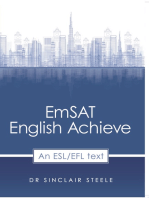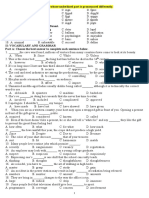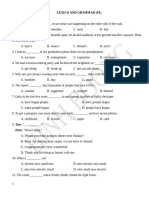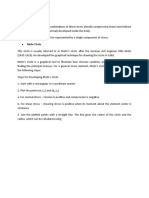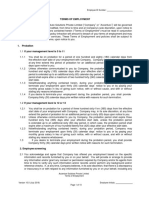0 ratings0% found this document useful (0 votes)
50 viewsI. Choose A, B, C or D That Has The Underlined Part Pronounced Differently
I. Choose A, B, C or D That Has The Underlined Part Pronounced Differently
Uploaded by
Hà Giang Nguyễn ThịThe document contains a listening test with multiple choice questions about pronunciations, stress patterns, sentence completion, and grammar. It also includes a passage to fill in the blanks with appropriate word forms. The test covers various aspects of the English language.
Copyright:
© All Rights Reserved
Available Formats
Download as PDF, TXT or read online from Scribd
I. Choose A, B, C or D That Has The Underlined Part Pronounced Differently
I. Choose A, B, C or D That Has The Underlined Part Pronounced Differently
Uploaded by
Hà Giang Nguyễn Thị0 ratings0% found this document useful (0 votes)
50 views5 pagesThe document contains a listening test with multiple choice questions about pronunciations, stress patterns, sentence completion, and grammar. It also includes a passage to fill in the blanks with appropriate word forms. The test covers various aspects of the English language.
Original Title
28-2
Copyright
© © All Rights Reserved
Available Formats
PDF, TXT or read online from Scribd
Share this document
Did you find this document useful?
Is this content inappropriate?
The document contains a listening test with multiple choice questions about pronunciations, stress patterns, sentence completion, and grammar. It also includes a passage to fill in the blanks with appropriate word forms. The test covers various aspects of the English language.
Copyright:
© All Rights Reserved
Available Formats
Download as PDF, TXT or read online from Scribd
Download as pdf or txt
0 ratings0% found this document useful (0 votes)
50 views5 pagesI. Choose A, B, C or D That Has The Underlined Part Pronounced Differently
I. Choose A, B, C or D That Has The Underlined Part Pronounced Differently
Uploaded by
Hà Giang Nguyễn ThịThe document contains a listening test with multiple choice questions about pronunciations, stress patterns, sentence completion, and grammar. It also includes a passage to fill in the blanks with appropriate word forms. The test covers various aspects of the English language.
Copyright:
© All Rights Reserved
Available Formats
Download as PDF, TXT or read online from Scribd
Download as pdf or txt
You are on page 1of 5
I.
Choose A, B, C or D that has the underlined part pronounced differently
1. A. climate B. comic C. hike D. website
2. A. worked B. laughed C. hoped D. naked
3. A. cover B. category C. ancient D. decorate
4. A. erupt B. humor C. UFO D. communicate
5. A. Buddhish B. bomb C. viable D. bulb
II. Choose the word ( A, B, C or D) whose main stress pattern is not the same as that of the others.
1. A. comprise B. depend C. design D. novel
2. A. tropical B. collection C. tendency D. charity
3. A. friendliness B. occasion C. pagoda D. deposit
4. A. importing B. specific C . impolite D. important
5. A. federation B. unpolluted C. disappearing D. profitable
III. Choose the best answer to complete each sentence.
1. The tourists asked me_______ to the museum.
A. how could they get B. how to get C. could they get D. how they get
2. All that rubbish will have to be ________ at once.
A. get rid of B. got rid of C. got rid . getting rid of
3. The meeting will start when everyone_______.
A. will arrive B. arrives C. is arriving D. will have arrived
4. Janet has_______ several prizes for her singing.
A. won B. gained C. made D. taken
5. Playing ball in the classroom was a bad idea, boys. You could_______ a window.
A. broke B. have been breaking C. be breaking D. have broken
6. _______ my shyness, they refused to give me the job as a receptionist.
A. Despite B. As for C. Due to D. Instead of
7. Victor: “Have you seen Helga?” Ann: “She was here earlier but I haven’t seen her_______ a while
now.”
A. at B. for C. by D. about
8. They didn’t have_______ in their suitcase for all the things they had bought here.
A. room B. place C. area D. size
9. I am leaving the key under the pot in the garden_______ you should be home earlier than usual.
A. because B. in case C. so that D. though
10. I couldn’t_______ her. She is a fast runner.
A. come up with B. catch up with C. bring back D. get away
11. ________ you mind if I use your dictionary?
A. Will B. Do C. Can D. Did
12. I found it interesting to live in the_______ society of Australia although this diversity was confusing sometimes.
A. poly-cultural B. horticultural C. semi-cultural D. multicultural
13. I borrowed the money_______ the bank.
A. to B. of C. for D. from
14. The robber was made _______ where he had hidden the money.
A. to confess B. confess C. confessing D. to confessing
15. I’m tired of washing by hand. I could_______ with a washing machine.
A. make B. get C. have D. do
16. Would you like to help me_______ these photocopies?
A. carry out B. give out C. bring along D. come across
17. To my_____, the washing machine helps lighten women’s hard work.
A. belief B. way C. opinion D. mind
18. Studies indicate that_______ collecting art today than ever before.
A. there more people B. more people that are C. there are more people D. people there are more
19. Every computer consists of a number of systems_______ together.
A. who work B. work C. they work D. that work
20. All the sentences below use “the”, which is the correct one?
A. Can you pass the sugar please? B. The crime is a problem in many big cities.
C. The apples are good for you. D. I love the skiing.
21. All of them but Tom …………….having dinner at home tonight.
A. is B. are C. was D. were
22. The environment ………………..animals and plants are living is badly destroyed.
A. which B. where C. in where D. in that
23. ………………….for an hour, the meeting started at 3 o’clock.
A. Having delayed B. Having been delayed C. Delaying D. Be delayed
24. Nobody was late for the meeting last night, ………………….?
A. wasn’t he B. weren’t they C. were they D. was he
25. They asked me a lot of questions, ………………….I couldn’t answer.
A. most of which B. of which most C. most of that D. of that most
26. Nestled along the shoreline of Hudson Bay ______________________.
A. are several recently settled Inuit communities B. several recently settled Inuit communities
are there
C. near several recently settled Inuit communities D. is where several recently settled Inuit
communities
27. I am well _________ with the problems encountered in starting a business.
A. aware B. informed C. acquainted D. knowledgeable
28. In fact the criminals ___________into because the front door was wide open and so they just walked
in.
A. needn't have broken B. didn't need break
C. didn't need to break D. needn't to have broken
29. The city libraries present a gloomy picture of the ___who used to flock the libraries every evening.
A. gradual reduction of readers B. gradual readers reduction
C. gradual readers of reduction D. reduction gradual readers
30. I have looked through the report, but I must admit, only ___________.
A. superficially B. thoroughly C. carefully D. seriously
31. - " Who wrote this poem?" - " It's said ______ written by one of the Bronte sisters."
A. to be B. to have been C. to being D. to having been
32. After Jill had realized that the new computer was not what she really wanted, she ____ it for an other
one.
A. dropped B. traded C. turned down D. bought
33. “If only I hadn’t lent him all my money!” -“_____________”
A. Well, you did, so it’s no use crying over spilt milk. B. All right. You will be OK.
C. Sorry, I have no idea. D. I’m afraid you will have to do it.
34. The teacher always ______that the student make an outline before writing the complete essay.
A. reports B. tells C. says D. recommends
35. Only if you do what you tell others ___________ as they are told.
A. will they do B. they will do C. they won't do D. won't they
36. _________of transportation has given someone the idea for a new type of toy.
A. Mostly forms B. Most every form C. Almost forms D. Almost every form
37. ___________one day by a passing car, the dog never walked proper again.
A. Having injured B. Injuring C. Injured D. To be injured
38. ___________ you to be offered that job, would you have to move to another city?
A. Should B. Were C. Had D. Provided that
39. A trust employee was discovered to have ____ confidential plans to a competing company.
A. stolen B. spread C. rumored D. leaked
40. Poor management brought the company to ___________of collapse.
A. the edge B. the foot C. the ring D. the brink
41. The doctors are examining the dog __________the child for rabies, which is a dangerous disease
___________immediate treatment.
A. biting/ required B. bitten/ required C. bitten/ requiring D. biting/ requiring
42: The ship ________ sail from the habour on a stormy day.
A. set B. gave C. went D. made
43. He _______to his friend’s party when his parents asked him to go home.
A. goes B. was going C. went D. has gone
44. There’s a strange man behind us. I think ______.
A. we are followed B. we are being followed C. we are being following D. we are
following
45. Which of the following is the strongest advice?
A. You should get a hair- cut. B. If I were you, I’d get a hair-cut.
C. You ought to get a hair- cut. D. You really must get a hair- cut.
IV. Read the following passage carefully and put the words in brackets into their correct forms
There is still no adequate _______(1. EXPLAIN) why, several thousand years ago, cultures in both
Egypt and South America saw the _______(2. INTRODUCE) of pyramids. Was it coincidence?
Many ________
(3. SCIENCE) believe that it was, and state that there is no _______(4. POSSIBLE) at all that people
from two distant continents traded information on _______(5. BUILD) techniques. However,
some _______
(6. REVOLUTION) theories in recent years, based on the _______(7. DISCOVER) that the two
cultures also share key myths, legends and beliefs, suggest that the _______(8. APPEAR) of
pyramids on opposite sides of the world was no coincidence at all. One ______ (9. RESEARCH)
working on this, Crystal David, said: “The _______(10. IMPORTANT) of finding out the truth here
cannot be exaggerated. It could change our whole understanding of the history of the world.”
V. Complete the passage by filling in each blank with ONE suitable word
When the day comes, give yourself plenty of time to do everything: have breakfast but don't drink
(1)_______ much; go to the toilet; arrive on time, but not too early or you will find yourself getting
more and more nervous while you wait to start. Try not to talk (2)_______ the exam before you go in.
In the exam, calm (3)_______ down by breathing deeply and thinking positively. Read the exam
questions carefully and underline all of the key instruction words (4) _______ indicate how the
questions should (5) _______ answered. If possible start with the ones you can do easily to give you
confidence. Remember what you've learnt from practicing questions and doing mock exams previously
and plan your use of time. Don't panic (6) _______ everyone around you seems to start writing furiously
straight away and don't be tempted to follow their example.
Finally, after the exam, don't join in a discussion about (7) _______ everyone else did, (8) _______
you want to frighten yourself, and drain your self-confidence for the next exam. Above (9) _______,
remember that exams are not designed to catch you out, (10) _______ to find out what you know, what you
understand and what you can do.
VI. Complete the passage by choosing the best option A, B, C or D to fill in each blank
Mobile phones release microwave radio emissions. Researchers are questioning (1) __________
exposure to these radio waves might (2) _______ to brain cancer.
So far, the data are not conclusive. The scientific evidence does not (3) _______ us to say with
certainty that mobile phones are categorically (4) _______. On the other hand, current research has not
yet (5) _______ clear adverse effects associated with the prolonged use of mobile phones.
Numerous studies are now going (6) _______ in various countries. Some of the results are
contradictory but others have shown an association between mobile phone use and cancer. (7) _______,
these studies are preliminary and the issue needs further, long – term investigation.
Until scientific data are more definite, it is prudent (8) _______ people to try not to use mobile
phone for long (9) _______ of time. Don’t think that hand-free phones are any safer either. At the
moment, research is in fact showing the (10) _______ and they may be just as dangerous.
1. A. where B. what C. whether D. as to
2. A. cause B. lead C. produce D. bring
3. A. enable B. make C. able D. let
4. A. risky B. secure C. unhealthy D. safe
5. A. investigated B. demonstrated C. caused D. produced
6. A. by B. on C. through D. about
7. A. Though B. Additionally C. However D. While
8. A. if B. for C. when D. with
9. A. amounts B. periods C. quantities D. intervals
10. A. fact B. opposite C. way D. truth
VII. Read the passage carefully and choose the best answer A, B, C or D to each of the questions that follow
At the supermarket these days, there is often a selection or aisle that sells just organic products. There
are also many new stores opening up that specialize just in organic fruits and vegetables. Organic food
is becoming more and more popular these days due to concerns about the safety of conventionally
grown food. Organically grown produce, though, is often more expensive to buy. Consumers need to
understand why something is labeled “organic” in order to make the best choices when purchasing food
for themselves and their families.
Several factors contribute to this higher price. Though there are some small differences, government
agencies across the world agree on what qualifies a product as organic: such products must be grown
without chemical fertilizers or pesticides. Also, livestock, such as cows, pigs and chickens, must not be
injected with artificial growth hormones or antibiotics. These standards result in food that is generally
healthier and tastier. Without harsh pesticides and chemical fertilizers, crop plants produce more
antioxidants and other beneficial nutrients. The farmers, their families, and their communities also
benefit from a cleaner and safer environment. Fertilizer runoff is a major environmental problem and
affects places far away from farms. Their mass production also contributes to global warming. Organic
production techniques encourage environment stewardship for the Earth and long-term agricultural sustainability.
Those standards ensure a safe and nutritious supply of food from organic farms. However, organic
farming reduces crop yields per farm while increasing the labor required. As a result, organic food is
generally more expensive. The price difference may be offset slightly in the future, as consumers ask for
more organically grown produce and more suppliers jump into the market to fill that demand. Many people,
though, are willing to pay that extra cost for organic food, given the health and environmental benefits.
1. What is one disadvantage of organic food?
A. No one knows their effect on people’s health and the environment.
B. They often cost more than conventionally grown foods.
C. Organic foods aren’t readily available.
D. They don’t taste as good as other types of food.
2. The word “that” in paragraph 1 refers to _______.
A. new stores B. opening up C. aisles D. organic products
3. What has made organic food grow in popularity these days?
A. Organic products’ low prices. B. Concerns about the safety of conventionally grown food.
B. The increase in the number of organic food stores. D. Customers’ love for organic food.
4. The word “result in” in paragraph 2 is closest in meaning to _______.
A. result from B. lead to C. deprive of D. manufacture
5. Which of the following is a criterion for certification of organic food?
A. It must have a minimum standard for taste and appearance.
B. No artificial substances can be used in growing the food.
C. Organic food must be grown in special areas.
D. They must be sold at a special price in supermarkets.
6. Who would most likely determine if something is considered organic?
A. An individual farmer raising corn C. A consumer advocacy group
B. Scientists doing agricultural research D. The Ministry of Agriculture
7. What is one problem with conventional farming?
A. Manufacturing fertilizers increases can give rise to global warming. B. The surplus of food grown is
too large.
C. The market for crops becomes imbalanced. D. Farmers can’t get enough
supplies.
8. What is one benefit of growing organic food?
A. There is more stability in food prices. C. People are able to eat more.
B. Those who grow the food are healthier. D. The food supply is predictable.
9. The word “offset” in paragraph 3 could be best replaced by _______.
A. upset B. worsened C. balanced D. destroyed
10. What is the author’s tone in this passage?
A. positive B. critical C. disbelieving D. tragic
VII. Identify the one underlined word or phrase that should be corrected or rewritten.
1. Preserving natural resources mean reserving them for our future.
2. Despite of the increase in air fares, most people still prefer to travel by plane.
3. Regardless of your teaching method, the objective of any conversation class should be for students to
practice speaking words.
4. The injured man was taken to the hospital.
5. In order for one to achieve the desired results in this experiment, it is necessary that he work as fastly
as possible.
6. Many television newscasters make the public an eyewitness to the news by means of on-the- spot, alive report.
7. It may be argued that modern presidents have far great responsibilities than their predecessors did.
8. He is such a friend person. He greets me with a smile every time I see him.
9. Anyone reproducing copyrighted works without permission of the holders of the copyrights are breaking the law.
10. Hardly he had got downstairs when the phone stopped ringing.
VIII. Complete the second sentence so that it has a similar meaning to the sentence printed before it.
1. You should review your lessons for the exam.
It’s time_____________________________________________________________________
2.That man used to work with me when I lived in New York.
That’s ______________________________________________________________________
3.What a pity they close the shops at lunch- time.
I wished ____________________________________________________________________
4. We like ice- cream but we don’t have it every day.
Although ____________________________________________________________________
5.When did you start working in that factory?
How long ___________________________________________________________________
6. Oil was slowly covering the sand of the beach.
The sand ____________________________________________________________________
7. “ Where’ s the station car- park?” Mrs. Smith asked.
Mrs. Smith asked _____________________________________________________________
8. He was sorry he hadn’t said goodbye to her at the airport. -> He regretted .....................
9. I advise you not to buy that car.
If __________________________________________________________________________
10. Why don’t you ask her yourself?
I suggest that _________________________________________________________________
You might also like
- PDF Ambit Bill CompressDocument3 pagesPDF Ambit Bill CompressJim ShortNo ratings yet
- I. Choose A, B, C or D That Has The Underlined Part Pronounced DifferentlyDocument10 pagesI. Choose A, B, C or D That Has The Underlined Part Pronounced DifferentlyQuang HuyNo ratings yet
- TA B1 Reading-Writing DV 5226 KEYDocument17 pagesTA B1 Reading-Writing DV 5226 KEYMinh AnhNo ratings yet
- Cụm Từ Cố Định (Collocations)Document4 pagesCụm Từ Cố Định (Collocations)Nguyễn Trần Hoài ÂnNo ratings yet
- Test Yourself 12-Feb. 21, 2022: Choose The Word Which Is Stressed Differently From The RestDocument10 pagesTest Yourself 12-Feb. 21, 2022: Choose The Word Which Is Stressed Differently From The RestVy Đặng ThảoNo ratings yet
- Practice 3Document2 pagesPractice 3Ta Van DiepNo ratings yet
- Grammar - Vocab 2Document2 pagesGrammar - Vocab 2Bùi Phương NamNo ratings yet
- 3 de Thi Thu DHCD Co Dap An Tham KhaoDocument23 pages3 de Thi Thu DHCD Co Dap An Tham KhaoLê Thị Kiều OanhNo ratings yet
- Mark The Letter A, B, C, or D On Your Answer Sheet To Indicate The Correct Answer To Each of The Following QuestionsDocument8 pagesMark The Letter A, B, C, or D On Your Answer Sheet To Indicate The Correct Answer To Each of The Following QuestionsTrần Thị OanhNo ratings yet
- 20 Multiple Choice Test and Keys PDFDocument85 pages20 Multiple Choice Test and Keys PDFPhượng UyểnNo ratings yet
- Test 8Document5 pagesTest 80989576586aNo ratings yet
- đề kiểm tra hsg tiếng anh lớp 9Document13 pagesđề kiểm tra hsg tiếng anh lớp 9Thanh TràNo ratings yet
- Test 12Document5 pagesTest 120989576586aNo ratings yet
- 100 Trac Nghiem. Hay - K Dap AnDocument5 pages100 Trac Nghiem. Hay - K Dap AnPhương Anh ĐàmNo ratings yet
- (Lib24.vn) Bai-Tap-Bo-Tro-Hsg-Tieng-Anh-Lop-12Document7 pages(Lib24.vn) Bai-Tap-Bo-Tro-Hsg-Tieng-Anh-Lop-12Nhii NhiiNo ratings yet
- Lexico Grammar 1Document7 pagesLexico Grammar 1Minh Anh BùiNo ratings yet
- Exercise 18Document2 pagesExercise 18Thiện TríNo ratings yet
- Lexico - E140Document7 pagesLexico - E140Elize WillyNo ratings yet
- Advanced Vob 1 - KeyDocument4 pagesAdvanced Vob 1 - KeyDuyên Nguyễn ThịNo ratings yet
- Vocab-Grammar 1 Choose The Best Word or Phrase To Complete The Following SentencesDocument11 pagesVocab-Grammar 1 Choose The Best Word or Phrase To Complete The Following SentencesKim YếnNo ratings yet
- Practice Test 6Document8 pagesPractice Test 6minhtuvonguyenNo ratings yet
- PRACTICE TEST 6 - Bài LàmDocument8 pagesPRACTICE TEST 6 - Bài LàmLê Quốc KhánhNo ratings yet
- Idioms WorksheetDocument11 pagesIdioms WorksheetNguyễn Huỳnh Mai ChâuNo ratings yet
- December 28, 2021 (Group 9A)Document10 pagesDecember 28, 2021 (Group 9A)Đỗ Minh TuấnNo ratings yet
- Test 11Document5 pagesTest 110989576586aNo ratings yet
- De On Chuyen 13Document5 pagesDe On Chuyen 13an MiaNo ratings yet
- General English - No.2: Time: 30 Minutes Marks: 100Document7 pagesGeneral English - No.2: Time: 30 Minutes Marks: 100Chembula JahnaviNo ratings yet
- Year 5 Grammar CompetitionDocument4 pagesYear 5 Grammar CompetitionEva WongNo ratings yet
- Lexico Grammar 4Document4 pagesLexico Grammar 4Uyên Nhi Trương0% (1)
- Test 17-19Document19 pagesTest 17-19Quốc Khánh NguyễnNo ratings yet
- Exercise 10Document2 pagesExercise 10Thiện TríNo ratings yet
- De On Chuyen 14Document4 pagesDe On Chuyen 14an MiaNo ratings yet
- (Hang Thỏ) Chuyên ĐHSP HCM 2020-2021Document8 pages(Hang Thỏ) Chuyên ĐHSP HCM 2020-2021Hyu BoảNo ratings yet
- English 12 Mini Test 1A (Multiple Choices 1 - 3) Mã đề: 136Document7 pagesEnglish 12 Mini Test 1A (Multiple Choices 1 - 3) Mã đề: 136Vu Thu HaNo ratings yet
- Sample Test 1Document9 pagesSample Test 1A NguyễnNo ratings yet
- Thi Vao Chuyen Anh TP HCM 0809Document9 pagesThi Vao Chuyen Anh TP HCM 0809Linh TranNo ratings yet
- De Chuyen Anh 2Document10 pagesDe Chuyen Anh 2ANH DUCNo ratings yet
- 11.11 No 38Document7 pages11.11 No 38nguyentuanminhthanhsonNo ratings yet
- 8a. CONSOLIDATION SBTDocument8 pages8a. CONSOLIDATION SBTNHƯ NGUYỄN THỊ QUỲNHNo ratings yet
- Lexico and Grammar (P1)Document91 pagesLexico and Grammar (P1)maiha341986No ratings yet
- Test 13Document7 pagesTest 13Minhh Huyenn VuNo ratings yet
- Mixed Test T95-105Document5 pagesMixed Test T95-105quynhchii2209No ratings yet
- Revision For The 1st Term TestDocument10 pagesRevision For The 1st Term Testbot k1enNo ratings yet
- Practice Test Grade 9 (16.1.2022)Document6 pagesPractice Test Grade 9 (16.1.2022)LinsNo ratings yet
- Tuyen Tap de Thi Olympic Bang BDocument101 pagesTuyen Tap de Thi Olympic Bang Bngduytkim100% (1)
- Lexico and GrammarDocument43 pagesLexico and Grammardanghoaithuong3072010No ratings yet
- BTVN B2-26-6Document8 pagesBTVN B2-26-6quannhanvuongNo ratings yet
- TEST 6 KeyDocument10 pagesTEST 6 KeyPhạm Nguyễn Tuyết HạnhNo ratings yet
- Chän Mét Tõ Cã PHÇN in Nghi NG ® Îc PH T ©M KH C So Víi C C Tõ Trong Cïng NhãmDocument17 pagesChän Mét Tõ Cã PHÇN in Nghi NG ® Îc PH T ©M KH C So Víi C C Tõ Trong Cïng NhãmNgọc TrinhNo ratings yet
- Practice Test 10Document5 pagesPractice Test 10Hoang Quynh AnhNo ratings yet
- đề 86Document5 pagesđề 86Hồ Ngọc TrAnhNo ratings yet
- E12 de Cuong HK1 2023-2024Document16 pagesE12 de Cuong HK1 2023-2024Hiếu NguyễnNo ratings yet
- ĐỀ CƯƠNG ÔN TẬP TH CUỐI KỲ II -TA 9Document6 pagesĐỀ CƯƠNG ÔN TẬP TH CUỐI KỲ II -TA 9Ly NguyễnNo ratings yet
- Advanced Practice Test 4Document7 pagesAdvanced Practice Test 4Trịnh Hồng NgátNo ratings yet
- Review 5Document5 pagesReview 5Ms. Thanh NgânNo ratings yet
- Lexico 04Document5 pagesLexico 04doanngoclinh2.5.2No ratings yet
- Test 3Document5 pagesTest 3Mai YenNo ratings yet
- Test 2Document5 pagesTest 2Lãnh Hàn Bê ĐêNo ratings yet
- English Grade 12Document8 pagesEnglish Grade 12Beza EnyNo ratings yet
- 100 Câu NG Pháp THPTQG 9cnn 10 - 7Document7 pages100 Câu NG Pháp THPTQG 9cnn 10 - 7Vân HàNo ratings yet
- Digital Meter: RAASM's Digital MetersDocument13 pagesDigital Meter: RAASM's Digital MeterskupatNo ratings yet
- HPE Nimble Storage Deployment Considerations For VMware Vsphere 6Document34 pagesHPE Nimble Storage Deployment Considerations For VMware Vsphere 6Rapture M.B.No ratings yet
- TELC B2 NyelvtanításDocument56 pagesTELC B2 NyelvtanításBalintEmma100% (5)
- Combined Stresses 1Document19 pagesCombined Stresses 1Mae Belle AngayNo ratings yet
- Sailor TT-3000E Mini-C GMDSS SYSTEMDocument2 pagesSailor TT-3000E Mini-C GMDSS SYSTEMvu minh tienNo ratings yet
- Memorandum of UnderstandingDocument5 pagesMemorandum of UnderstandingJethro Virrey PancubitNo ratings yet
- DTR BHWDocument2 pagesDTR BHWZeezyanNo ratings yet
- Diameter Routing: Use Case GuideDocument14 pagesDiameter Routing: Use Case Guidemonel_24671100% (1)
- SM 8100 CDocument375 pagesSM 8100 CMarioFerreNo ratings yet
- Outline: Week 10 - Laplace Transform Part 2 (Textbook: Ch. 6)Document16 pagesOutline: Week 10 - Laplace Transform Part 2 (Textbook: Ch. 6)siarwafaNo ratings yet
- PackRyt BLR Longevity ChartDocument1 pagePackRyt BLR Longevity ChartGonzalo Alonso QuintanaNo ratings yet
- Performance Evaluation of Routing Protocol RIPv2, OSPF, EIGRP With BGPDocument7 pagesPerformance Evaluation of Routing Protocol RIPv2, OSPF, EIGRP With BGPLee HeaverNo ratings yet
- (@NEETpassionate) Aakash CST - 19ADocument18 pages(@NEETpassionate) Aakash CST - 19AShankhayan DuttaNo ratings yet
- Exercise 2.3: SolutionDocument9 pagesExercise 2.3: SolutionNandini GuddadNo ratings yet
- ACH150X Course Study Notes (Precipitation Titrations) 2020Document8 pagesACH150X Course Study Notes (Precipitation Titrations) 2020Kgaugelo TraciaNo ratings yet
- Ase2000 V2.28 Um PDFDocument292 pagesAse2000 V2.28 Um PDFamin rusydiNo ratings yet
- After Class Quiz Week 4 - Marketing Research - T222PWB-1Document8 pagesAfter Class Quiz Week 4 - Marketing Research - T222PWB-1Vy JessieNo ratings yet
- 2023 DHC Zydus Vs CiplaDocument140 pages2023 DHC Zydus Vs Ciplaclickipr7No ratings yet
- 7 Soliton PDFDocument8 pages7 Soliton PDFAnonymous K9F6Z7LwuNo ratings yet
- Terms of EmploymentDocument10 pagesTerms of EmploymentAarav TutorialsNo ratings yet
- Dang Van Minh Directive - March 1968Document3 pagesDang Van Minh Directive - March 1968Phoenix Program FilesNo ratings yet
- Manual Seat Mo Escooter 125Document354 pagesManual Seat Mo Escooter 125jonajr1206No ratings yet
- SESSION 11, 12, 13, 14 - SEGMNENTATION REvisedDocument129 pagesSESSION 11, 12, 13, 14 - SEGMNENTATION REvisedritam chakrabortyNo ratings yet
- R207EDocument2 pagesR207EHugo VieiraNo ratings yet
- Datasheet 16070 Pillow Block Bearing Pedestal Type UCP - enDocument2 pagesDatasheet 16070 Pillow Block Bearing Pedestal Type UCP - enIslam MuhammedNo ratings yet
- KAI Expense Sheet Feb'24Document1 pageKAI Expense Sheet Feb'24muhammad majidNo ratings yet
- Statement of Account: Date Narration Chq./Ref - No. Value DT Withdrawal Amt. Deposit Amt. Closing BalanceDocument7 pagesStatement of Account: Date Narration Chq./Ref - No. Value DT Withdrawal Amt. Deposit Amt. Closing BalanceShefali AnandNo ratings yet
- Architecture Specifications For W - FDocument12 pagesArchitecture Specifications For W - FDileepa DissanayakeNo ratings yet
- Cpar Admin GuideDocument272 pagesCpar Admin GuidetanashibaNo ratings yet
